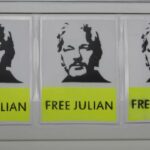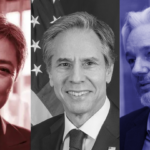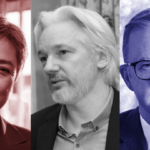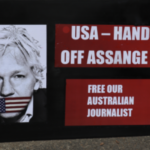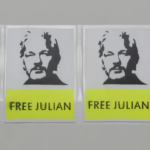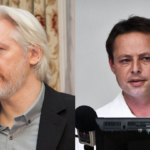As Morrison Cosies Up to Former CIA Chief, It’s Clear Assange Never Stood a Chance
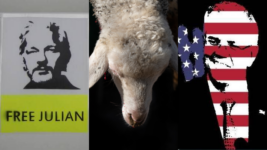
Former PM Scott Morrison announced on 23 January that he’s leaving federal politics this month for bloodier pastures, and as the news of his future endeavours came to light, the details reinforced the fact that there’s no need for dystopian fiction these days, as were now living the plotlines.
Morrison leaves Parliament House in Canberra, as one of the most divisive figures to have ever held the role of Australian prime minister. And the issues that plagued his time in office were rampant misogyny, rising tensions in the Indo Pacific, heightened racism and increasing militarism.
Indeed, the member for Cook’s multi-ministry power grab scandal is likely the most selfish act a PM has ever conducted in the nation’s history.
And his new military venture capital role, working alongside a key former US Trump administration official, reveals his having laid the groundwork for his future roles whilst in office.
The outgoing Liberal member is taking up a role with DYNE Maritime, an Australian-founded US-based military venture capital firm investing in technologies related to AUKUS, where former Trump secretary of state and CIA director Mike Pompeo was employed as strategic advisor in early January.
This collaboration underscores one more point: WikiLeaks founder Julian Assange never stood a chance under the Morrison government, as it’s believed the embarrassment the Australian publisher caused Pompeo while he was heading the CIA, led the Trump administration to pursue him.
Pursuing, kidnapping, killing
Assange was dragged out of London’s Ecuadorian Embassy by UK police in April 2019, at the behest of its own government and, more importantly, due to pressure from the Trump administration. The journalist was incarcerated briefly over breach of bail and has since been held on remand for the US.
The revelations that suggest this was instigated by Pompeo come from a September 2021 Yahoo News article, which has Trump administration officials discussing in 2017, whether it would be possible to kidnap Assange from the embassy or even to assassinate the Australian journalist.
Based on 30 former US officials, the article has then CIA director Pompeo seeking revenge against the WikiLeaks publisher, in response to the 2017 publishing of the details of Vault 7: a secret CIA hacking tool manual.
Although only the details of the Vault 7 hacking arsenal were revealed and not how to use them.
The Obama administration decided not to pursue Assange over the content of his 2010 publications of hundreds of thousands of leaked US classified military and government files.
However, Pompeo went on to publicly describe WikiLeaks as a “non-state hostile intelligence service” five weeks after the Vault 7 leak.
And following this announcement, the CIA then commenced surveilling Assange in the embassy, and the article has Trump flagging potential murder, while it’s clear that Liberal MP Scott Morrison’s future colleague was pivotal in the instigation of the close to five-years-long remanding of Julian.
Cushy jobs lined up
Morrison explained last month that he is leaving parliament to take up “a series of global strategic advisory roles and private boards, focused on the US and Indo Pacific”.
The former PM’s role as one of the architects of AUKUS, a military pact with the US and the UK, has facilitated this arrangement.
Besides cosying up to Pompeo, Morrison is also taking on the role of nonexecutive vicechair at advisory firm American Global Strategies, working under Trump-era security adviser Robert O’Brien, which tends to give some more scope to our ex-PM’s relationship with that administration.
Morrison has explained that he’d had a great working relationship with O’Brien in the past, and the former Trump administration official has described the ex-PM as one of the most consequential leaders of the last decade, which is true in terms of undermining Australian democracy.
As for his other role with Pompeo, DYNE Maritime launched a AUD$157 million fund in October to invest in dual-purpose technologies: those that are developed for military and civilian purposes. And the former CIA head is a keen AUKUS proponent.
Yet, Morrison’s future AUKUS technology-related role with the military venture capital firm and that at AGS both raise questions about his involvement with the Trump administration and would suggest reason as to why he simply ignored the UK imprisonment of an Australian on dubious grounds.
Backdoor buddies
Morrison notoriously said on the day the UK locked up Assange in London’s maximum-security Belmarsh prison that he’d “have to make his way through whatever comes his way in terms of the justice system there” and “he won’t be getting any special treatment from Australia”.
The then PM added, “he’ll be getting the same treatment that any other Australian would get”.
This outright dismissal to put any diplomatic effort into an Australian journalist who has fallen foul of the law in foreign climes, flies in the face of government endeavours to secure the release of Peter Greste from Egypt, James Ricketson from Cambodia and, last year, Cheng Lei from China.
The Morrison government in stark contrast to what normally occurs in the diplomatic sphere when an Australian journalist is arrested overseas under suspect circumstances, completely ignored the plight of Assange, which allowed current PM Anthony Albanese to champion the cause to no avail.
Crickey raised concerns about the close relationship between Morrison and Pompeo in 2022, in regard to China and AUKUS. However, as it appears that the ex-CIA chief lead the charge against Assange, as he had an axe to grind, it’s likely this influenced his buddy, our PM, on the matter.
A critical moment
Assange remains in Belmarsh gaol, having spent the last half decade in prolonged isolation with his health deteriorating rapidly to the point that there have been significant fears for his life on the part of UN officials and medical practitioners.
Julian’s brother Gabriel Shipton sent out a press release on Wednesday to advise that current UN Special Rapporteur on Torture, Australian Dr Alice Jill Edwards, had urged the UK government the day prior, to halt the extradition process due to grave concerns about Assange’s mental health.
Edwards underscores that Assange’s rights have been breached in regard to cruel and inhuman treatment, due to the excessive punishment the US reserves the right to hold against him, that being a maximum of 175 years inside, and that the transfer to the US would heighten his risk of suicide.
This effort on the part of an Australian working on behalf of the United Nations is welcomed at this “critical moment” in Assange’s case, yet it’s these kinds of efforts that the Morrison government could have made five years ago, rather than let matters deteriorate to the point they have.
And this current moment is so vital in the case of Julian Assange, as the WikiLeaks founder is about to appear before two justices of the UK High Court on 20 and 21 February, which is likely his final appeal of the UK decision to extradite the Townsville-born son to the United States.


